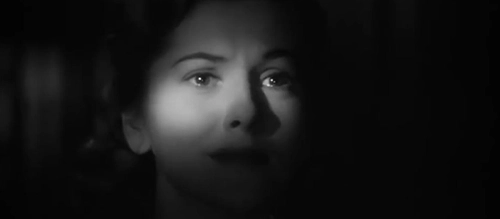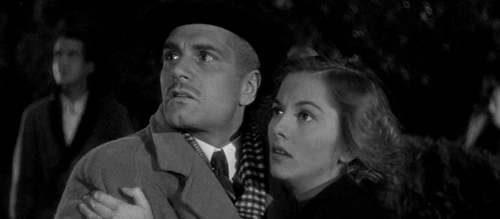Rebecca (1940) Review

Rebecca (1940)
Director: Alfred Hitchcock
Screenwriters: Robert E. Sherwood, Joan Harrison
Starring: Laurence Olivier, Joan Fontaine, Judith Anderson, George Sanders, Nigel Bruce, Reginald Denny, Florence Bates, Gladys Cooper
“Last night, I dreamt I went to Manderley again.”
Haunting words that begin both the book, and this feature film adaptation. Out of all the films Alfred Hitchcock put his hand to, only one won the Academy Award for Best Picture. Films such as Psycho, Vertigo, Rear Window, Shadow of a Doubt, and North by Northwest, might be seen as his masterpieces now, but as far as the Oscars are concerned, only one took the title. Hitchcock never went in for the supernatural much, at least in his feature films, and so it is interesting that he made Rebecca, the adaptation of Daphne du Maurier’s novel, as it is in essence a ghost story, minus the ghost. Considering, however, that he had previously adapted her novel “Jamaica Inn”, and would make one of her short stories into The Birds decades later, maybe it isn’t so shocking that his partnership with du Maurier was his most successful at the Academy Awards.
Enter Joan Fontaine, a woman who would, the following year, take the only acting win for a Hitchcock film in Suspicion. Young and inexperienced, she’s working as a paid companion to a rich older lady when she catches the eye of Sir Laurence Olivier’s Max de Winter, who marries her and takes her back to his sprawling English estate of Manderley. Everywhere the new Mrs de Winter goes, she cannot escape the shadow of Max’s previous wife, Rebecca, who drowned the year previous. Gothic, empty and imposing, the great house seems to be soaked in the way the late Mrs de Winter did things, and although she doesn’t walk the hallways anymore, her presence seems to stretch far beyond the grave.
Sumptuous and lavish, the picture still looks grand all these years later. The costumes are wonderful, the interior sets of Manderley beautiful, and it has all the grandeur one would expect. And yet, even in the daytime scenes there’s mist and smoke that seems to swirl around, shadows that catch Joan Fontaine at strange angles, and keep everything in that air of gothic mystery which manages to give you the chills without it even doing anything.

Joan Fontaine (as the unnamed new Mrs de Winter) and Laurence Olivier put in great performances in their respective roles, but it’s really Dame Judith Anderson’s turn as Mrs Danvers which catches the imagination. She’s cold, domineering, ready to scheme and push and persuade Fontaine’s character in any way she can, trying to break her down. Her calm, stoic demeanour is devoid of any life save for seething hatred for anything which isn’t the memory of Rebecca. Although the code back then meant they couldn’t specifically refer to lesbianism, there’s so much subtext that it’s impossible to think that there wasn’t something going on with her that’s more than just admiration. No wonder she was nominated for Best Supporting Actress for the film. She’s gone on to influence countless characters, countless performances.
Discussion must, however, also turn to Hitchcock’s direction. It was his first picture for the United States, and he had to fight producer David Selznik the whole way to get what he wanted. He did most of the editing in-camera to stop post-production edits, as Bong Joon-Ho would do later for films like Snowpiercer, to keep the meddling producers out of his vision. And yet, despite this lack of fallback contingency shots, everything flows wonderfully. The shots are beautifully timed, everything comes together in a seamless display of emotional manipulation. The film is dark and brooding, focusing on people manipulating others, what they want to see and what truth really is, and Hitchcock manages to keep us engaged as the drama slowly (and at times, laboriously) unfolds. It might be considered slow by modern standards, but it never lacks interest, and never lacks the ability to stick to its guns and go for exactly what it wants. It wants to be dark, to be serious, and to be treated with respect, and although Hitchcock adds in a little of his trademark humour in the opening scenes, once we get to the action proper, he keeps it back and lets it fly.
Nominated for a total of eleven Academy Awards (Picture, Director, Actor, Actress, Supporting Actress, Art Direction – Black and White, Cinematography – Black and White, Editing, Score, and Special Effects), that it only won two (picture and cinematography) is almost shameful. That it is the only film since supporting role Oscars were introduced in 1936 that won Best Picture but didn’t get any acting, writing, or directing wins, is almost as astonishing. It might not be exactly perfect, but it’s certainly damn close.
Score: 23/24

